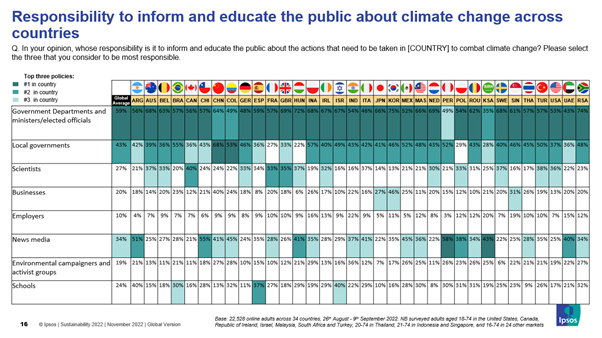Incentives, discounts and other inducements are most supported policies to help tackle climate change in new global study ahead of COP27
Policies that apply incentivisation, discounting and other inducements to help tackle climate change are more popular than taxation or reduced choice, a new Ipsos 34-country survey of more than 22,500 respondents looking at citizen support for policies has found.
Key Australian findings
- Reflecting rising awareness of climate change, an average of almost 7 in 10 (68%) citizens across the 34 countries are willing to accept new policies encouraging sustainable technology adoptions. Support for this policy among Australians is similar global average (69%).
- When it comes to mobility, Australians lag well behind other countries in their support for a policy giving more road space to pedestrians and cyclists. Only a third of Australians (32%) support this policy, compared to half (49%) of those surveyed globally. In Indonesia, three-quarters (75%) of citizens say they would support this at the expense of space for motorists. High levels of support are also seen in Peru (71%), Mexico (70%) and Thailand (67%). Australia sits alongside Canada and the United States (34%) and Japan (28%) with the lowest levels of support.
- Taxation on certain foodstuffs to tackle climate change is an unpopular option, both in Australia and globally. Having a higher tax on red meat and dairy products is opposed by half of Australians (48% compared to 40% globally) and only a quarter say they would support the policy (25% compared to 29% globally).
- When it comes to whose responsibility it is to educate the public on climate change, Australians place the responsibility is squarely with government departments and ministers/elected officials (68% compared to 59% globally). There are notable differences in opinion when looking at individual countries such as China, Colombia, Peru, Saudi Arabia, Canada, France, Great Britain, and Spain, with Australians among the most supportive of governments taking responsibility.
Ipsos Australia Public Affairs Director, Stuart Clark, said: "Most Australians are sold on the idea that new technologies and incentives for green investments are the best solutions for tackling climate change."
“Compared to other countries, we are far less supportive of interventions that would change our travel habits, especially making more space on our roads for pedestrians and cyclists. Increasing taxes on non-renewable fuels is an unpopular policy in most countries. Australians are in line with the global average, with only a third supporting an increase in taxes on non-renewable energy.”
Policy support varies by topic and region
The most popular policy, with an average of almost 7 in 10 (68%) citizens across the 34 countries surveyed saying they would support it, was for government spending on subsidies to make environmentally friendly technologies cheaper (e.g., solar panels, electric vehicles).


More than half (a global average of 59%) would also support changing product pricing to make environmentally friendly products cheaper (conversely environmentally damaging products more expensive). Countries with the highest levels of support are Indonesia (74%), Mexico (72%), Colombia and Chile (both 71%).
Providing incentives for investing in green financial products and services (e.g., pensions) also receives strong support globally (59%). This policy, however, is less popular across several European countries, the US (48%), and Canada (48%).
Giving more road space to pedestrians and cyclists at the expense of motorists is the fourth most popular policy globally (49%).
An average of approximately 2 in 5 citizens globally would support the policies of taxing more environmentally damaging travel (39%), requiring all food outlets to provide vegan options (37%) and banning petrol/gas- and diesel-powered vehicles from the central areas in cities and towns to create vehicle-free zones (37%). Opposition to these policies increases notably with a quarter to a third of citizens globally saying they would oppose them (30%, 24% and 31% respectively).
Two in 5 citizens globally would oppose policies for higher taxes on red meat and dairy products (40%) and higher taxes on non-renewable energy sources such as gas and oil for heating and cooking (42%). Less than a third (29%) say they would support either policy.
Whose responsibility is it to educate the public?
Ipsos observed that lack of action by citizens to engage in and change their behaviours towards having a smaller carbon footprint is often driven more by a lack of understanding than it is by lack of will/intent (i.e., the believe-true gap). This indicates the need for better education of citizens.
There is notable consensus at a global level that the responsibility for educating the public on climate change lies with government departments and ministers/elected officials (59%). Just over 4 in 10 think it is the responsibility of local governments and just over a third (34%) would consider news media to be responsible, followed by scientists (27%), schools (24%), business (20%) and environmental campaigners/activist groups (19%).

Country variations
In China (68%) and Colombia (53%), the highest level of responsibility for educating the public on climate change is considered to lie with local government (vs. global average of 43%).
- In Peru (58%) and Saudi Arabia (43%) citizens suggest the media has the greatest responsibility for driving education on climate change (vs. global average of 34%).
- Scientists come fourth in terms of responsibility for climate education based on the global average (27%) but are second in Canada (40%), France (35%) and Great Britain (35%).
- Spain stands out with citizens choosing schools (37%) as having responsibility for climate education vs. a global average of 24%.

About this study
These are the results of a 34-country survey conducted by Ipsos on its Global Advisor online platform. Ipsos interviewed an international sample of 22,528 adults aged 18-74 in the US, Canada, Republic of Ireland, Israel, Malaysia, South Africa, and Turkey, 20-74 in Thailand, 21-74 in Indonesia and Singapore and 16-74 in all other countries between 26th August and 9th September 2022.

